Policy Report: Ethiopia
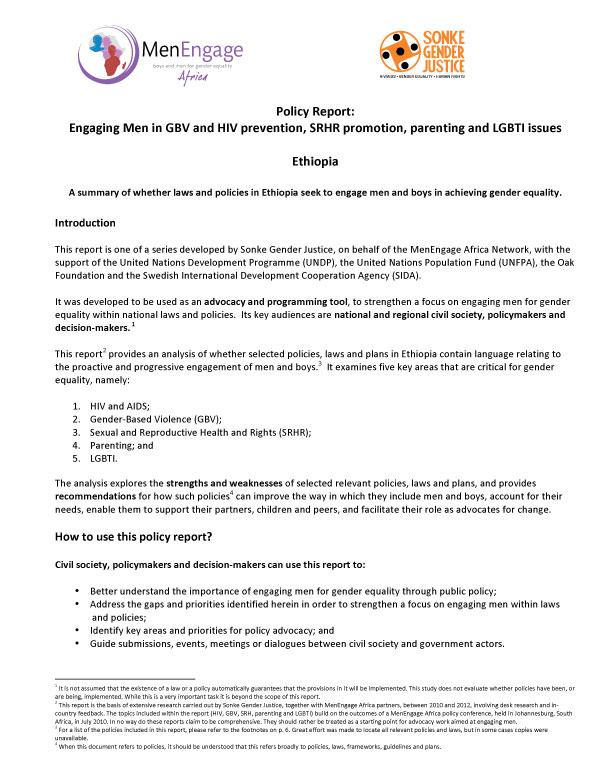
The analysis found that most policies and plans acknowledge that there is gender inequality between men and women in the Ethiopian society. For example, HIV and AIDS policies recognise that gender is a key driver of the pandemic and that women are more vulnerable to the disease than men. However, in most legislation, discussions on […]
Policy Report: Malawi
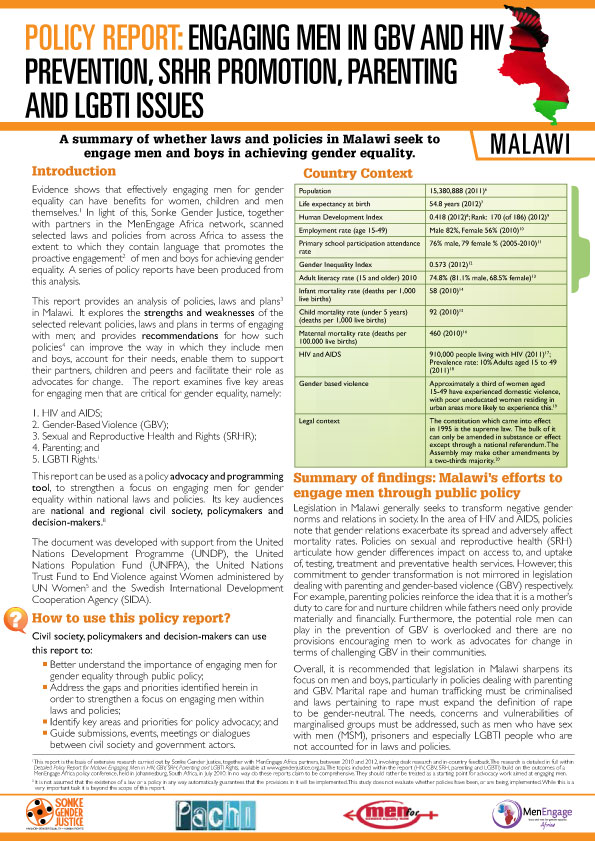
Legislation in Malawi generally seeks to transform negative gender norms and relations in society. In the area of HIV and AIDS, policies note that gender relations exacerbate its spread and adversely affect mortality rates. Policies on sexual and reproductive health articulate how gender differences impact on access to, and uptake of, testing, treatment and preventative […]
Policy Report: DRC
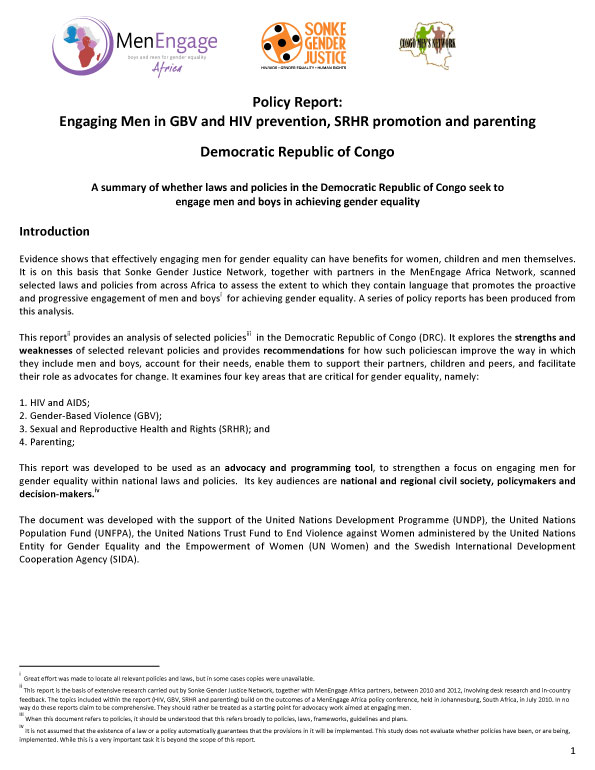
This analysis found that the DRC has made efforts in terms of engaging men and boys, but should include a stronger emphasis on influencing gender norms. While the sexual and reproductive health policies are engaging with men as clients, they are weak in engaging them as advocates for change. Specific steps need to be taken […]
Policy Report: Tanzania
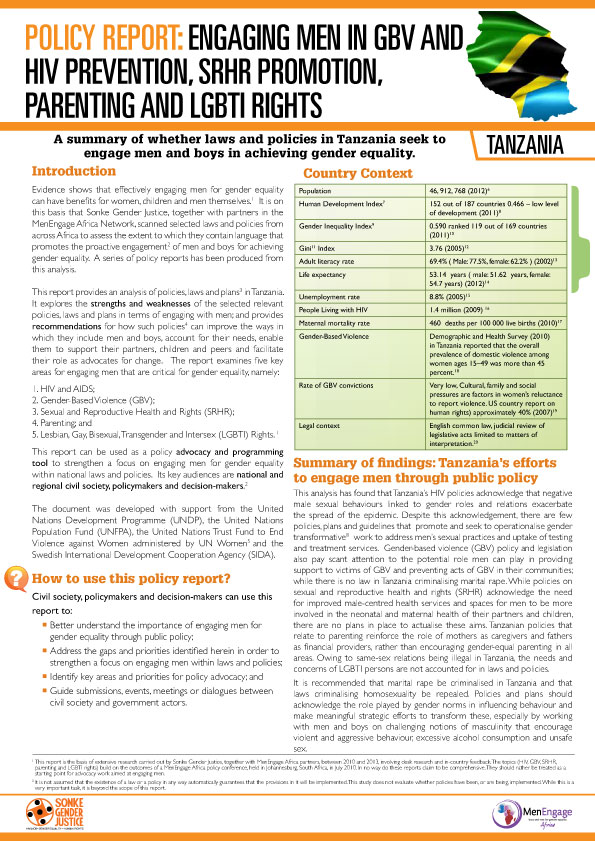
Few of Tanzania’s HIV policies promote and seek to operationalise gender transformative work to address men’s sexual practices and uptake of testing and treatment services. Gender-based violence (GBV) policies and legislation also pay scant attention to the potential role men can play in providing support to victims of GBV and preventing acts of GBV in […]
Policy Report: Namibia
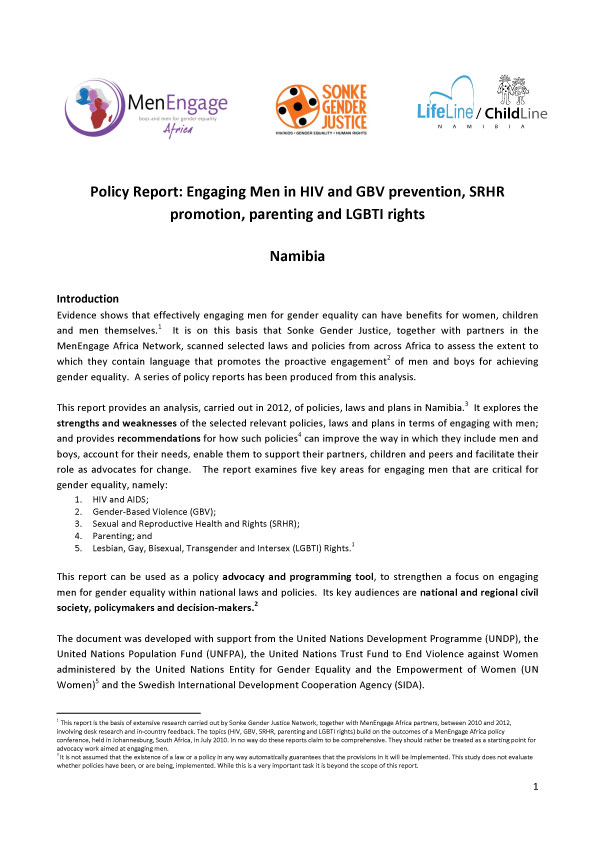
The analysis, carried out in 2012, found that while gender inequality is acknowledged within Namibia’s National Strategic Framework for HIV and AIDS, it is not afforded sufficient consideration and there is almost no planned interaction with men. Namibia’s GBV and parenting policies contain several strategies for engaging men and the sexual and reproductive health policies […]
Policy Report: Zambia
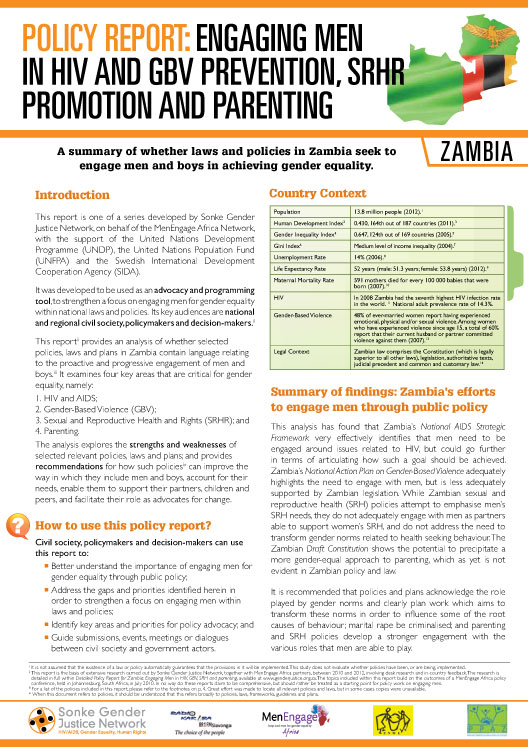
The analysis found that Zambia’s National AIDS Strategic Framework effectively identifies that men need to be engaged around issues related to HIV, but could go further in terms of articulating how such a goal should be achieved. Zambia’s National Action Plan on Gender-Based Violence adequately highlights the need to engage with men, but is less […]
Detailed Policy Report for Zambia
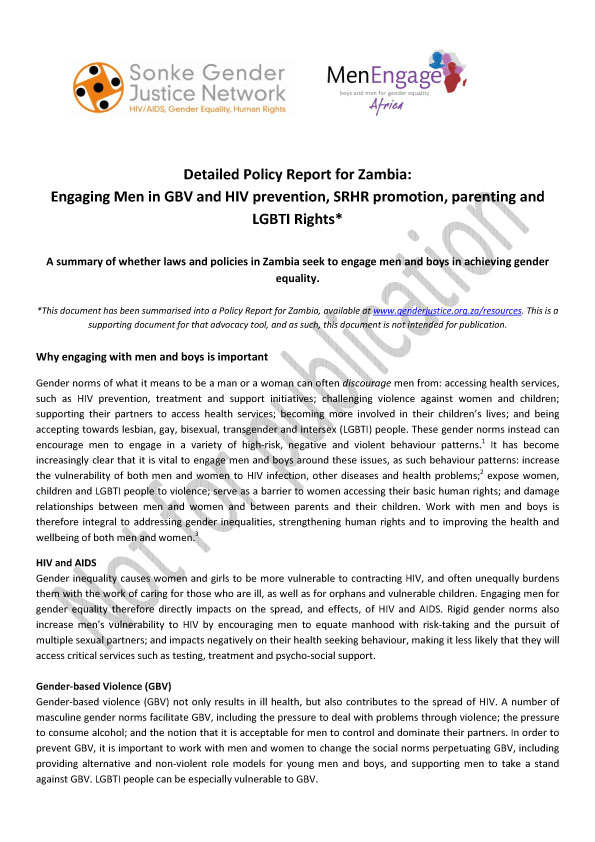
The analysis found that Zambia’s National AIDS Strategic Framework effectively identifies that men need to be engaged around issues related to HIV, but could go further in terms of articulating how such a goal should be achieved. Zambia’s National Action Plan on Gender-Based Violence adequately highlights the need to engage with men, but is less […]
Detailed Policy Report for Uganda
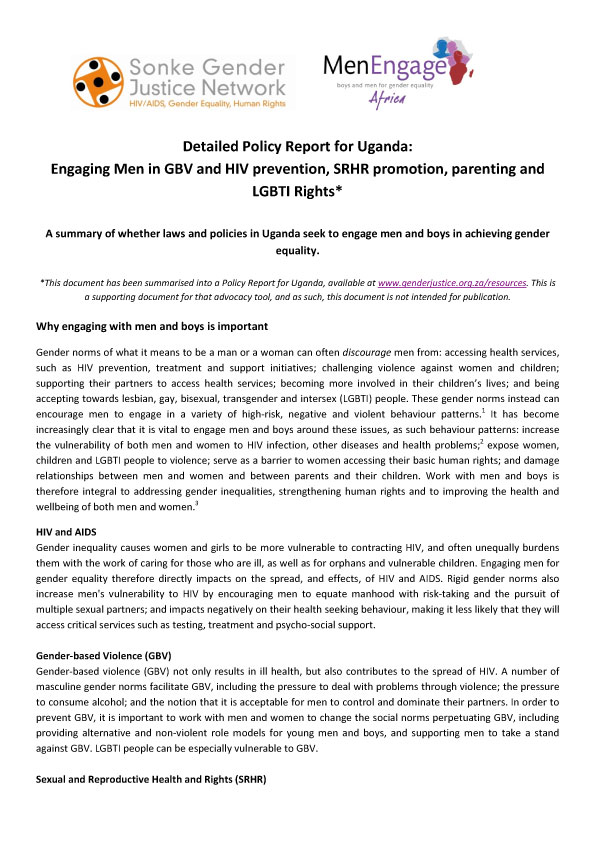
The analysis found that Uganda’s policies and plans regarding HIV need to be updated, and should include a stronger emphasis on targeting men and influencing gender norms. Gender-based violence (GBV) policies and plans prioritise the need to engage with men, but that the accompanying laws are lacking. While the sexual and reproductive health (SRH) policies […]
Policy Report: South Africa
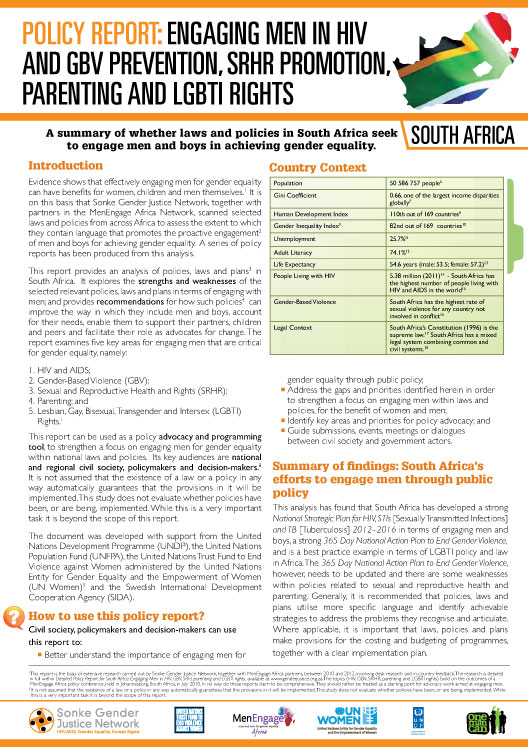
The analysis found that South Africa has developed a strong National Strategic Plan for HIV, STIs and TB 2012–2016 in terms of engaging men and boys, a strong 365 Day National Action Plan to End Gender Violence, and is a best practice example in terms of LGBTI policy and law in Africa. The 365 Day […]
Detailed Policy Report for South Africa
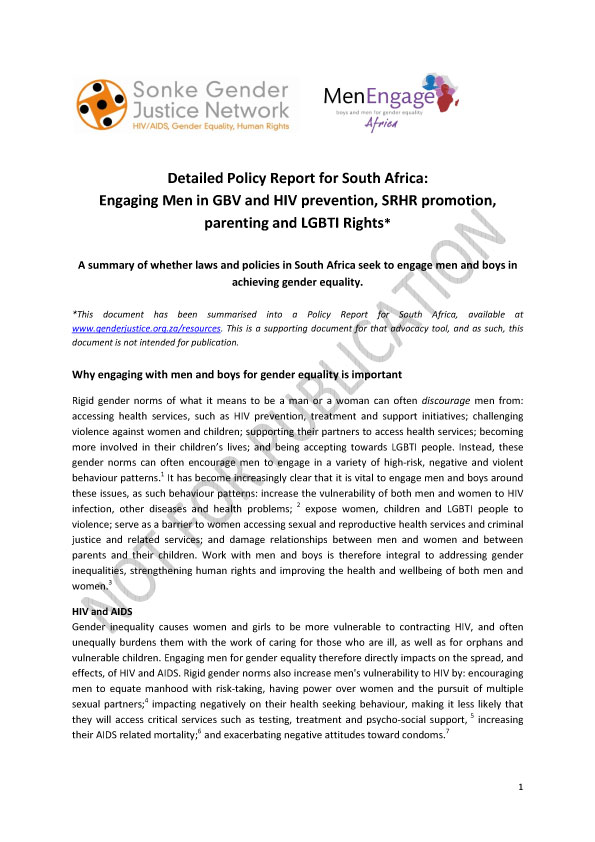
The analysis found that South Africa has developed a strong National Strategic Plan for HIV, STIs and TB 2012–2016 in terms of engaging men and boys, a strong 365 Day National Action Plan to End Gender Violence, and is a best practice example in terms of LGBTI policy and law in Africa. The 365 Day […]
Policy Report: Rwanda
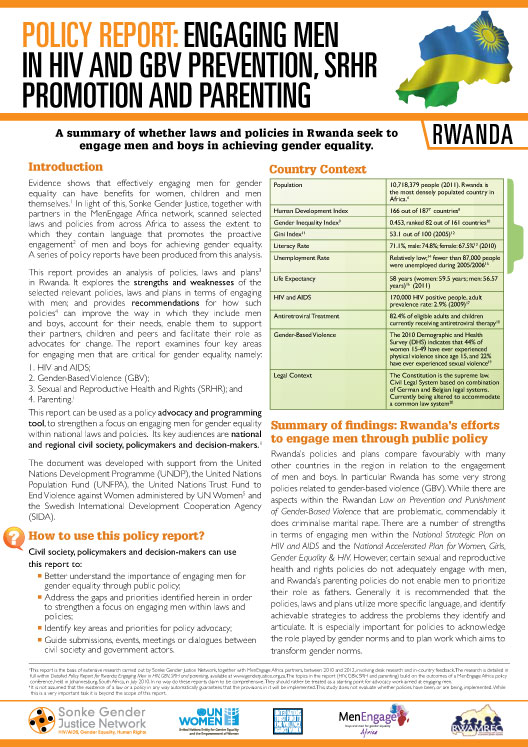
The analysis found that Rwanda’s policies and plans compare favourably with many other countries in the region in relation to the engagement of men and boys. In particular Rwanda has some very strong policies related to gender-based violence (GBV). While there are aspects within the Rwandan Law on Prevention and Punishment of Gender-Based Violence that […]
Detailed Policy Report for Rwanda
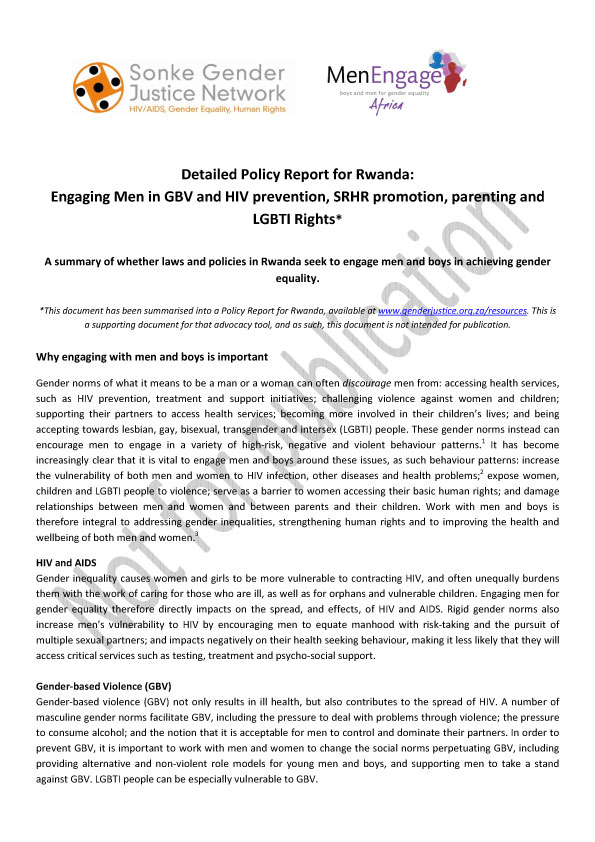
The analysis found that Rwanda’s policies and plans compare favourably with many other countries in the region in relation to the engagement of men and boys. In particular Rwanda has some very strong policies related to gender-based violence (GBV). While there are aspects within the Rwandan Law on Prevention and Punishment of Gender-Based Violence that […]
Policy Report: Kenya
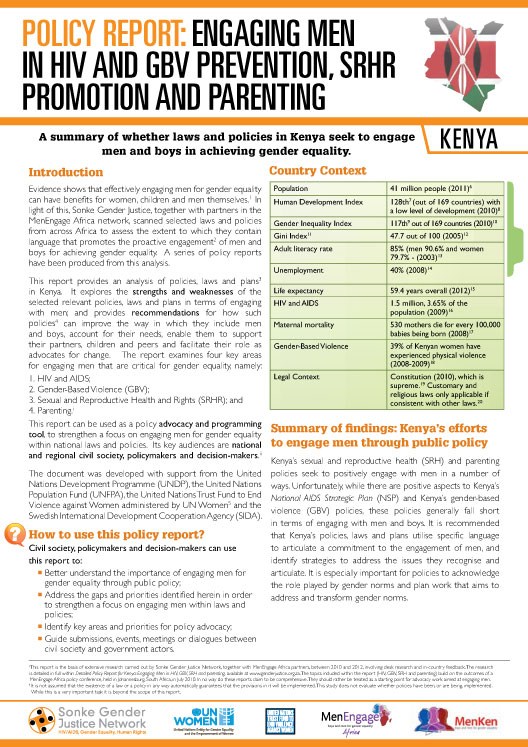
The analysis found that Kenya’s sexual and reproductive health (SRH) and parenting policies seek to positively engage with men in a number of ways. Unfortunately, while there are positive aspects to Kenya’s National AIDS Strategic Plan (NSP) and Kenya’s gender-based violence (GBV) policies, these policies generally fall short in terms of engaging with men and […]
Detailed Policy Report for Kenya
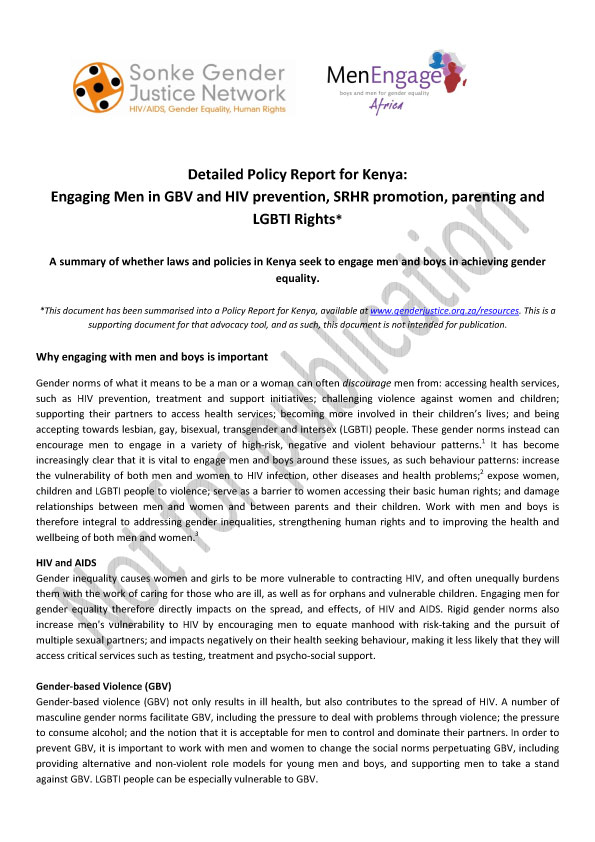
The analysis found that Kenya’s sexual and reproductive health (SRH) and parenting policies seek to positively engage with men in a number of ways. Unfortunately, while there are positive aspects to Kenya’s National AIDS Strategic Plan (NSP) and Kenya’s gender-based violence (GBV) policies, these policies generally fall short in terms of engaging with men and […]
MenEngage Africa Mid-Term Evaluation 2011 – 2013
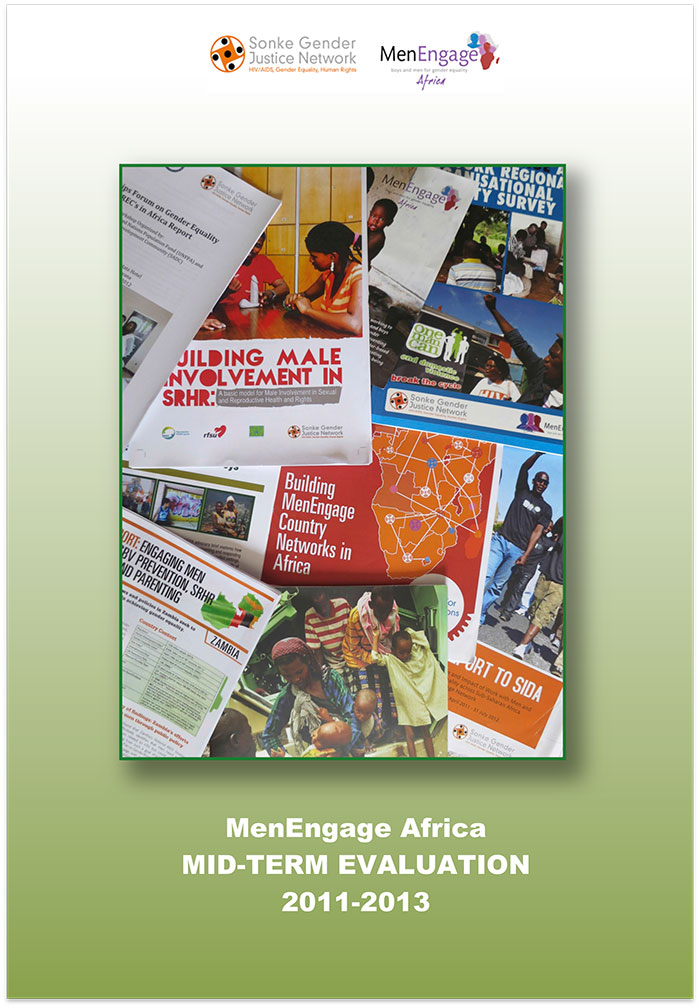
MenEngage is a global alliance of non-governmental organisations (NGOs) located within the global south and north and United Nations (UN) agencies that was established in 2004. MenEngage Africa (MEA) has been supported by funding by the Swedish International Development Cooperation Agency (Sida) and the Oak Foundation through Sonke Gender Justice Network (Sonke) since 2011. The […]
Regional Parliamentary Structures
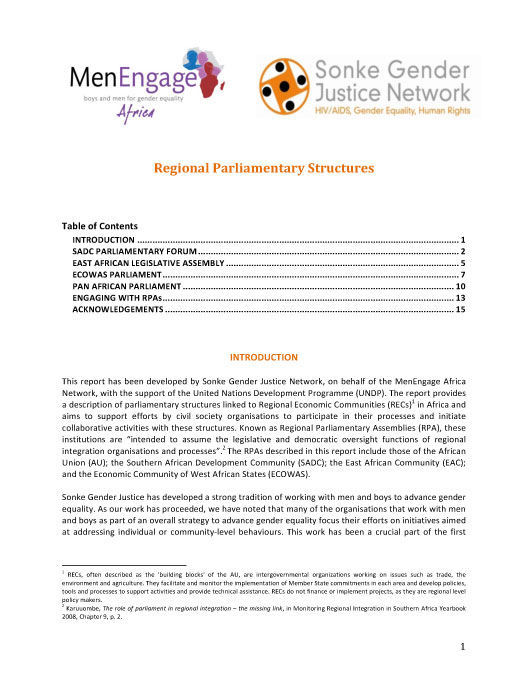
This report has been developed by Sonke Gender Justice, on behalf of the MenEngage Africa Network, with the support of the United Nations Development Programme (UNDP). The report provides a description of parliamentary structures linked to the Regional Economic Communities (RECs) in Africa and aims to support efforts by civil society organisations to participate in […]
MATI Mentorship Programme Evaluation Report
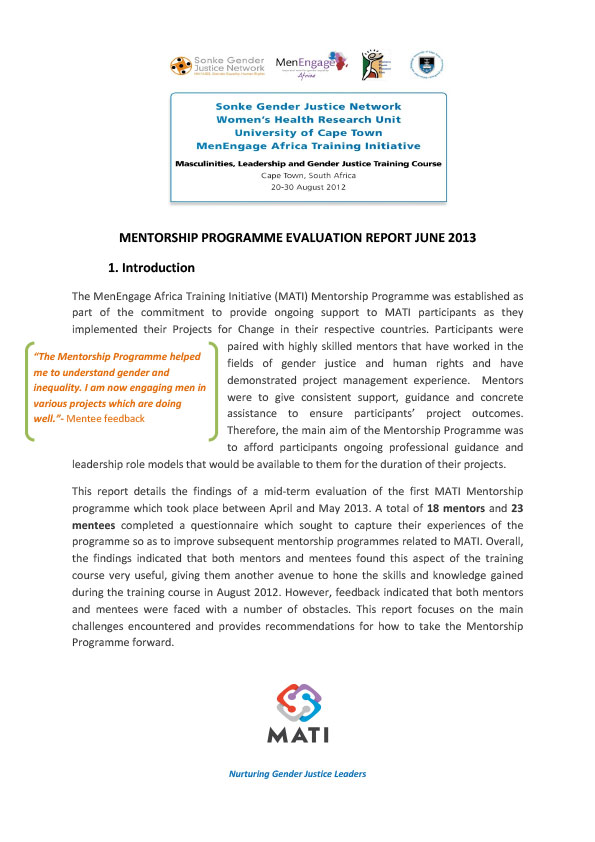
The MenEngage Africa Training Initiative (MATI) Mentorship Programme was established as part of the commitment to provide ongoing support to MATI participants as they implemented their Projects for Change in their respective countries. Participants were paired with highly skilled mentors that have worked in the fields of gender justice and human rights and have demonstrated […]
Scorecard on GBV Laws and Policies
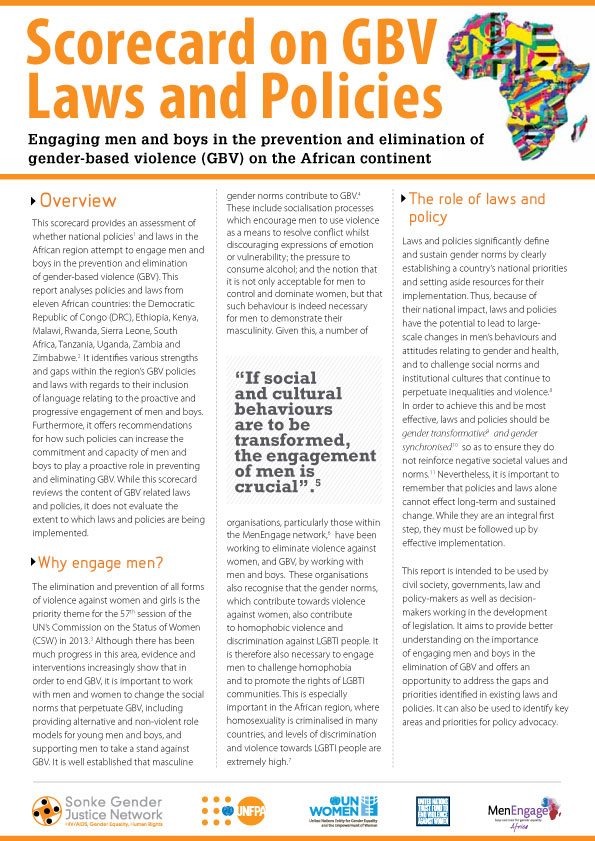
This scorecard provides an assessment of whether national policies and laws in the African region attempt to engage men and boys in the prevention and elimination of gender-based violence (GBV). This report analyses policies and laws from eleven African countries: the Democratic Republic of Congo (DRC), Ethiopia, Kenya, Malawi, Rwanda, Sierra Leone, South Africa, Tanzania, […]
MATI Training Course Report 2012
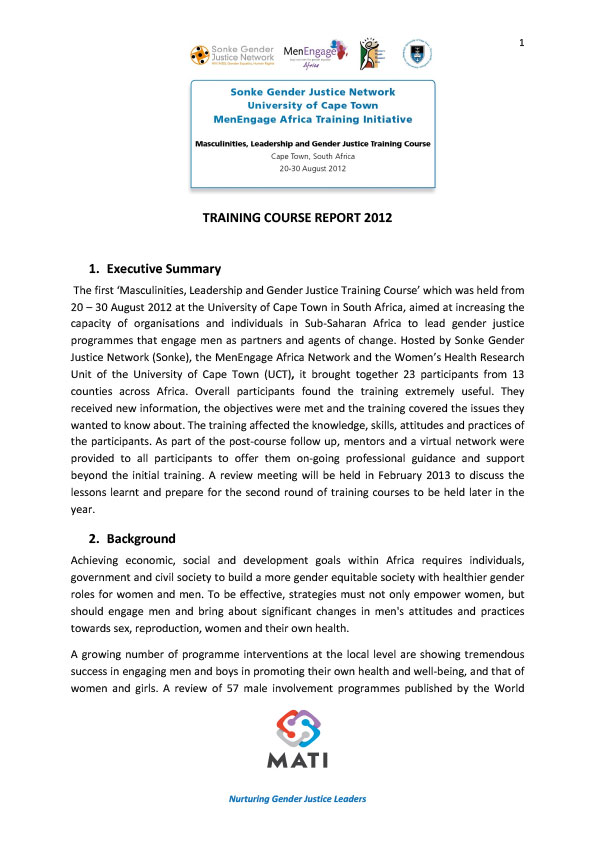
The first ‘Masculinities, Leadership and Gender Justice Training Course’ which was held from 20-30 August 2012 at the University of Cape Town in South Africa, aimed at increasing the capacity of organisations and individuals in Sub-Saharan Africa to lead gender justice programmes that engage men as partners and agents of change. Hosted by Sonke Gender […]
MenEngage Africa Regional Consultation on Child Rights, SRHR, LGBTI and Women’s Empowerment
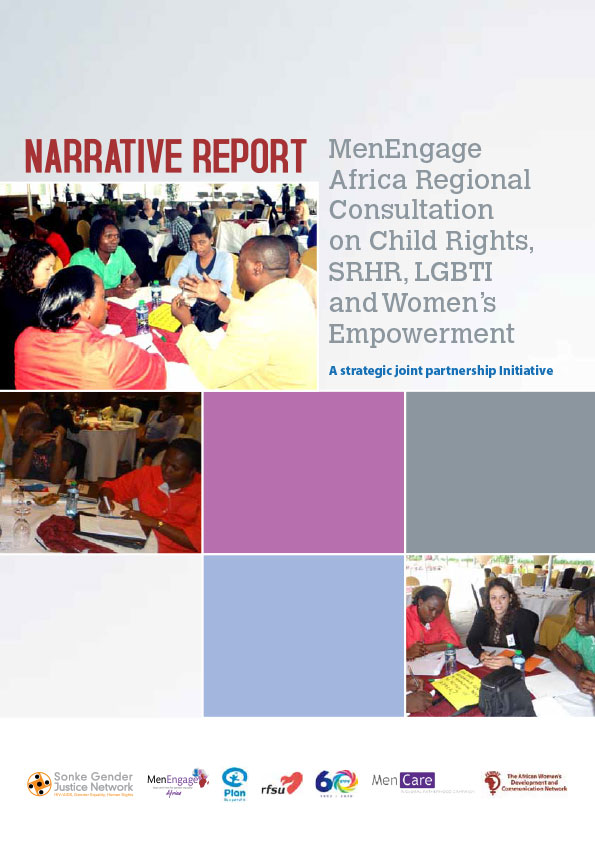
The purpose of the consultative meeting sought to review and strengthen a regional agenda in order to scale up MenEngage work in the region; impact and sustainability of work with men in enhancing gender equality, focusing particularly on strengthening partnerships, shared work and accountability with women’s rights organizations, including positive women’s networks, SRHR, LGBTI, and […]
The Menengage Africa Network Regional Organisational Capacity Survey
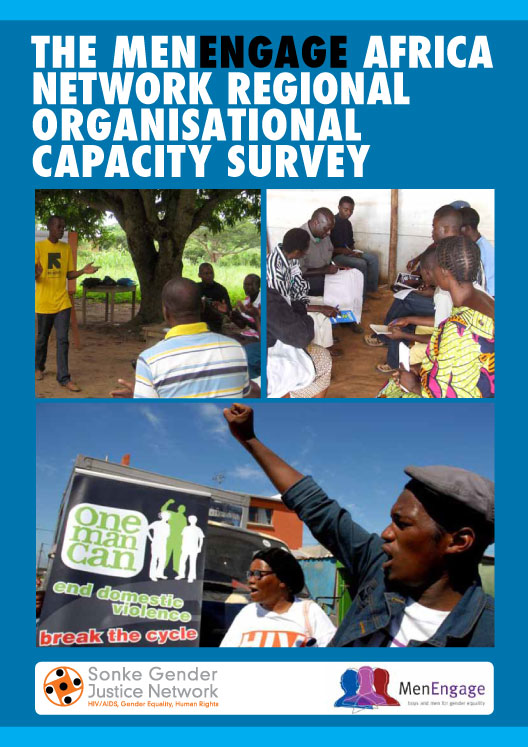
The MenEngage Africa Network Regional Organisational Capacity Audit, conducted in October and November 2010, assessed the existing capacity, focus areas and challenges facing organisations in the gender justice sector in the African region. Findings from the capacity audit serve to inform future interventions to build the capacity of the MenEngage Africa Network to promote work […]
MenEngage Africa Regional Update
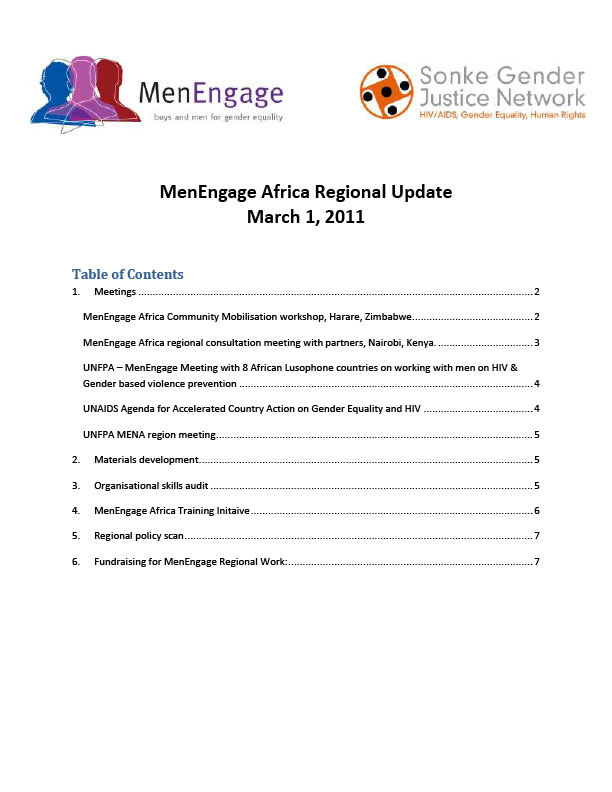
This update provides an overview of the progress made since the last report was submitted in September 2010. This includes meetings held, materials developed, an organisational skills audit, an overview of the consultation meeting on the MenEngage Africa Training Initiative, regional policy scan conducted, and the fundraising proposals submitted for their regional work during this […]
Beijing Plus 15 Progress Report for the 2010 UN CSW
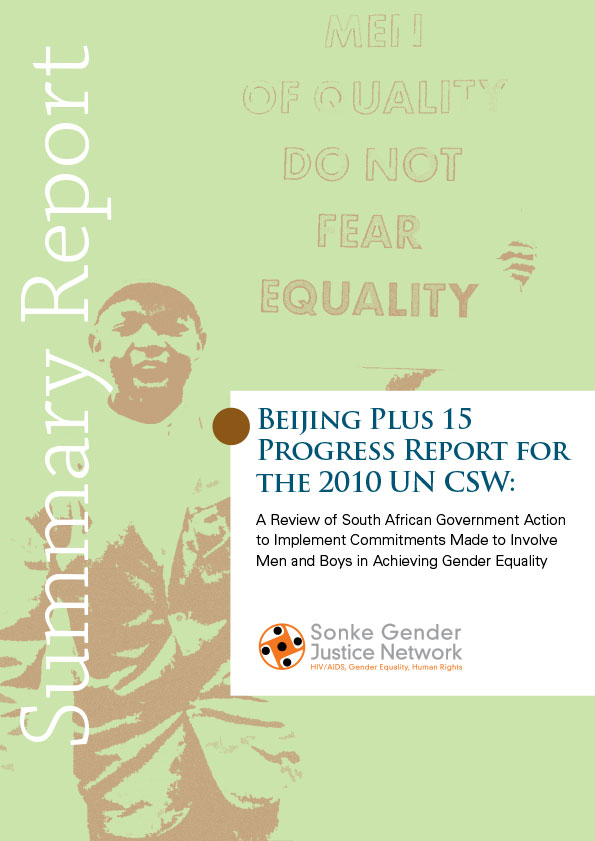
This report assesses the South African government’s progress in implementing international and national commitments to engage men and boys in achieving gender equality in five key areas: • Gender equality and the equal sharing of responsibility• Gender-based violence• Promoting male sexual and reproductive health• HIV services and facilities which encourage men to use them• Work […]
